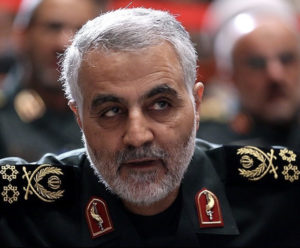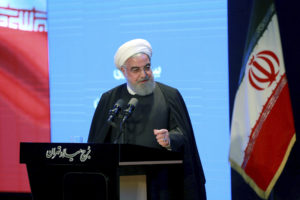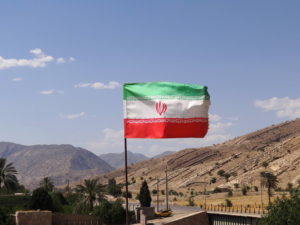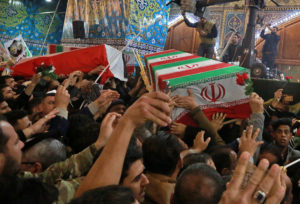Privatizing Murder
There is no set piece more emblematic of the tragic farce that is the American involvement in Iraq than the grotesque episode of Blackwater USA and the killing of civilians in Baghdad -- at least nine and as many as 28 -- on Sunday.WASHINGTON — There is no set piece more emblematic of the tragic farce that is the American involvement in Iraq than the grotesque episode of Blackwater USA and the killing of civilians in Baghdad — at least nine and as many as 28 — on Sunday.
Everyone has reacted on cue with the usual expressions of outrage or, at minimum, grave diplomatic concern over the fusillade of gunfire that was unleashed against Iraqis who apparently were bystanders to the passing of an American convoy that was being escorted by heavily armed Blackwater security guards.
The Iraqi government said it was pulling the private security firm’s license to operate in the country, and has asked that its contract be severed. But it seems there may not be a license, or if there was, it would have been granted by that wonderment of bureaucratic dysfunction and sectarian passion, the Iraqi Interior Ministry. The U.S. State Department, meanwhile, says it hasn’t been informed that Iraq has “lifted, suspended or terminated” any permit.
No matter. American diplomats now are sequestered in their Green Zone fortress, unable to motor around Iraq without their mercenary guards who have, in the interest of cooling tempers, been temporarily sidelined as investigations proceed. Yet it’s almost without question that, soon enough, some private security contractors will be back in action. They are as crucial to sustaining the American military occupation of Iraq as is the president’s unrepentant refusal to end it.
All the essential elements of governance in the Bush era come together in the Blackwater episode.
The heavy use of private armies — “corporate warriors” is the term used by Brookings Institution expert Peter Singer — helps to hide the initial and catastrophic decision to limit the number of American troops deployed far below what many military experts said was necessary to pacify post-invasion Iraq. Secrecy, another administration hallmark, prevented even the Congressional Research Service from getting a definitive count of the number of private contractors taxpayers support. “The executive branch either has not kept sufficient records to produce or has been unwilling to present basic, accurate information on the companies employed under U.S. government contracts and subcontracts in Iraq,” the researchers reported in July.
Add the odor of political cronyism: Blackwater’s founder, Erik Prince, has deep ties to the Republican Party and conservative religious organizations. He was a Republican congressional aide and briefly an intern in the White House of President George H.W. Bush, according to The News & Observer in Raleigh, N.C. When four Blackwater employees were murdered in Fallujah in 2004, the company turned for public relations and lobbying advice to the Alexander Strategy Group, a now-defunct Republican lobbying firm that was closely linked to former House Majority Leader Tom DeLay.
Meanwhile, the zone of lawlessness the Bush administration created for detainees at Guantanamo Bay, Cuba, for its global network of secret prisons and in its domestic surveillance program extended, as well, to private contractors. Under an order issued by the Coalition Provisional Authority, the American occupation bureaucracy that governed Iraq in the initial months after the invasion, private security contractors are immune from any legal action, including prosecution, that arises from their work. Nor are they subject to U.S. military law as are regular American forces. A law enacted in 2000 that conceivably could cover them hasn’t been tested. Nor, Singer says, has a 2006 effort to bring the private forces under the military justice system been implemented.
And no one — not the White House nor the Pentagon nor, apparently, the State Department — heeded repeated reports of abuse and flagrant violence against Iraqis that have dogged the private security guards for years. “Everybody has known about these problems,” Singer told me in an interview. “They’ve been widely reported.”
The Army’s investigation of the Abu Ghraib prison scandal identified private contractors as responsible for more than a third of abuses and identified six employees as culpable, Singer says. Yet, unlike soldiers who were court-martialed for their crimes at Abu Ghraib, no private contractor has been prosecuted. There even was a “trophy video” — of contractors for one security company shooting at Iraqi civilians — that the guards themselves posted on the Internet.
We have reached the inevitable moment of anger and recrimination. In keeping with the administration’s overarching philosophy that private business is always better — at everything — than government, we have privatized the most elemental government function of waging war. Now we will pay dearly for this folly.
Marie Cocco’s e-mail address is mariecocco(at)washpost.com.
© 2007, Washington Post Writers Group
Your support matters…Independent journalism is under threat and overshadowed by heavily funded mainstream media.
You can help level the playing field. Become a member.
Your tax-deductible contribution keeps us digging beneath the headlines to give you thought-provoking, investigative reporting and analysis that unearths what's really happening- without compromise.
Give today to support our courageous, independent journalists.






You need to be a supporter to comment.
There are currently no responses to this article.
Be the first to respond.